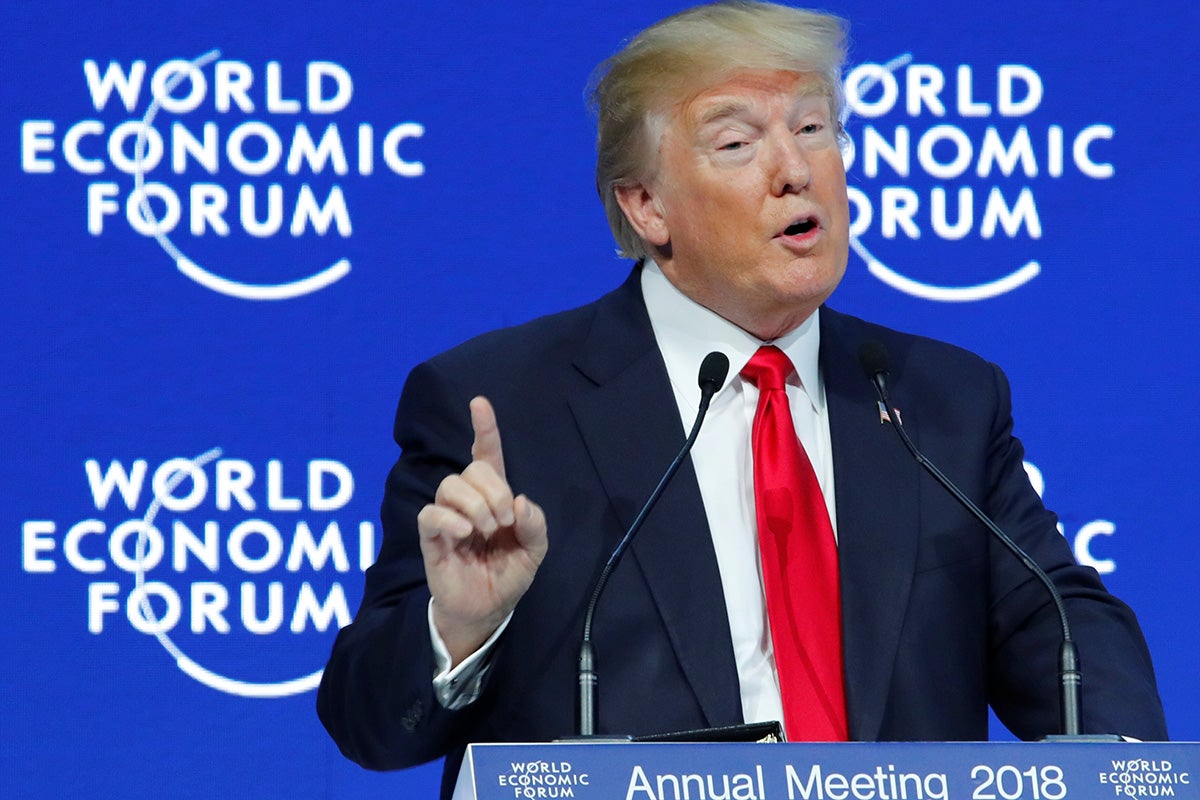EU business leaders are happy with Trumponomics, and other notes from Davos
Business leaders outside the US are happy with the President’s economic policies, the tech giants are worried about the future and India is set to exert its growing power


Davos is over for another year and the captains and the kings have departed.
What have we learned? There is so much noise about what is happening to the world economy – the core issue discussed at Davos – that I thought it might be helpful to set out the 10 most important points that I have jotted down.
One, big business outside the US is content with Trumponomics. The President sat down with a group of business leaders, mostly from Europe, and they purred. There was little or none of the embarrassment US business leaders have sometimes shown towards the President.

Two, the tax reforms introduced by his administration are a large part of this shift of mood. Though the booming equity markets are probably also part of it, the administration is seen as being able to get things done.
Three, the President’s challenge to free trade, while still worrying the business community, is now seen more as an acceptable modification of the present regime rather than a retreat into hard protectionism. If, for example, there are restrictions on Chinese imports into the US, many European business leaders would see that as a reasonable counter to Chinese restrictions on imports.
Four, there is a reassessment of China’s openness going on. Last year President Xi Jinping wowed the audience by saying: “The problems troubling the world are not caused by globalisation.” It was as though China was seeking to take on the global leadership that was being abandoned by the US. This year the Chinese leader did not attend, whereas the US delegation arrived in force, with both the Treasury Secretary and the Secretary of State joining the President. This was the biggest US delegation ever to come to Davos, and the first serving president to attend since Bill Clinton came in 2000. There was a sense of relief that the US was back. That leads to the next point.
Five, there is no substitute for US leadership of the world economy. No one else can provide it.
Six, German business is very self-confident and that confidence was increased by the strong likelihood that Angela Merkel will be able to form a government. But even if there had had to be new elections, the business community was pretty comfortable. The problem for German business is rising labour discontent and rising costs, not politics.
Seven, big tech is worried. If most segments of the business community were reasonably relaxed about their future, the large technology companies were concerned that they were somewhat in the doghouse. Handling of private information, their treatment of employees, particularly women staff, their relations with suppliers, abuse of monopolistic power and excessive dominance of the news media were all among the areas where they now realise that they are no longer the heroes of the world. They are not used to this and are not sure what to do about it.
Eight, there will be an acceptable Brexit deal. The fact that it is so much in the self-interest of both sides ensures that the deal will be negotiated. There were a host of small signs of this on every side. Common sense will prevail. There is, however, one Brexit issue where there is more ambiguity than before. This is over financial services. The new information coming out of Davos is that some people in the City think it is on balance better not to have full access to the European market if it means aligning regulation to that of Brussels. Europe is a relatively small part of the City’s business and is a slow-growing market. Better to focus on the rest of the world.
Nine, India will be much more important over the next 30 years than I had fully appreciated. It is the fastest-growing large economy in the world and will soon be the most populous. It will want to exert that power.
Finally, the world economy is at an economic sweet spot. There is solid growth but as yet little or no inflation. It won’t always be like this. As growth continues there is a danger that the boom will get out of hand. There were rumblings of concern about this at Davos from a number of speakers. At some stage there will be a global downturn. We just don’t know when.
Join our commenting forum
Join thought-provoking conversations, follow other Independent readers and see their replies
Comments
Bookmark popover
Removed from bookmarks